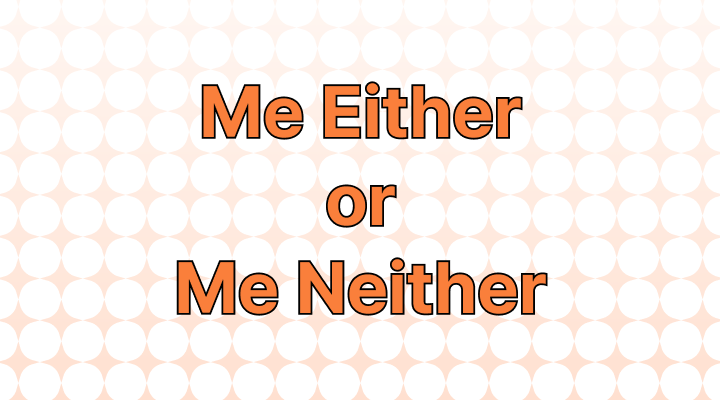Me either and Me Neither are used in response to negative statements or questions, indicating agreement or similarity of experience. However, the differences in their structures and contexts provide unique nuances to each phrase.
When is me neither used?
"Me neither" is the more commonly accepted and grammatically correct expression. It follows the same structure as "neither do I" or "neither am I," which are more formal ways to express the same sentiment.
For instance, if someone states, "I haven't been to that restaurant before," replying with "Me neither" indicates that you also haven't been to the restaurant. This phrase is often preferred in written communication and is considered more linguistically appropriate, as it conforms to established grammatical rules.
Other examples:
Dialogue 1
- Person A: I can't believe how early the meeting is tomorrow.
- Person B: Me neither. It's going to be a struggle to get up on time.
Dialogue 2
- Person A: The concert tickets were sold out by the time I tried to buy them.
- Person B: Ugh, me neither. I really wanted to go see that band.
In these two dialogues, "me neither" is used to express agreement with negative statements made by the other person. It indicates that both Person A and B share the same experiences or preferences.
When is me either used?
"Me either" can also be used but it is a more informal construction, often used in casual speech, especially in certain dialects or regions. It's typically used to agree with a negative statement made by someone else. For example, if someone says, "I don't like spicy food," you might respond with "Me either," meaning you also don't like spicy food.
Despite its informal usage, "me either" has faced criticism in some circles for not adhering to standard grammatical patterns, which has led to the popularity of the alternative phrase "me neither."
In summary, while both "me either" and "me neither" serve the purpose of expressing agreement with negative statements, "me either" is less formal and may be seen as non-standard in certain contexts. "Me neither" is the grammatically correct and widely recognized alternative, maintaining consistency with the structure of similar expressions. So, when seeking to convey agreement with a negative statement, "me neither" is the preferred choice for clear and accurate communication.
More dialogue examples:
- Sarah: I've never been a fan of cold weather.
John: Me neither. I always prefer warmer climates. - Aisha: I haven't had a chance to read that new book yet.
Michael: Me neither. My reading list keeps growing. - Lisa: I'm not a big fan of reality TV shows.
David: Me neither. I find them a bit shallow. - Mia: I can't stand long commutes.
Ethan: Me neither. They're such a waste of time. - Chris: I don't really understand how to play chess.
Olivia: Me neither. It seems so complicated.
Want to sound like a native speaker?
Engram’s AI-powered grammar checker makes your English sound like a native speaker’s, suggesting natural English expressions on top of fixing grammar, spelling, punctuation, word order, and vocabulary.

Reference













